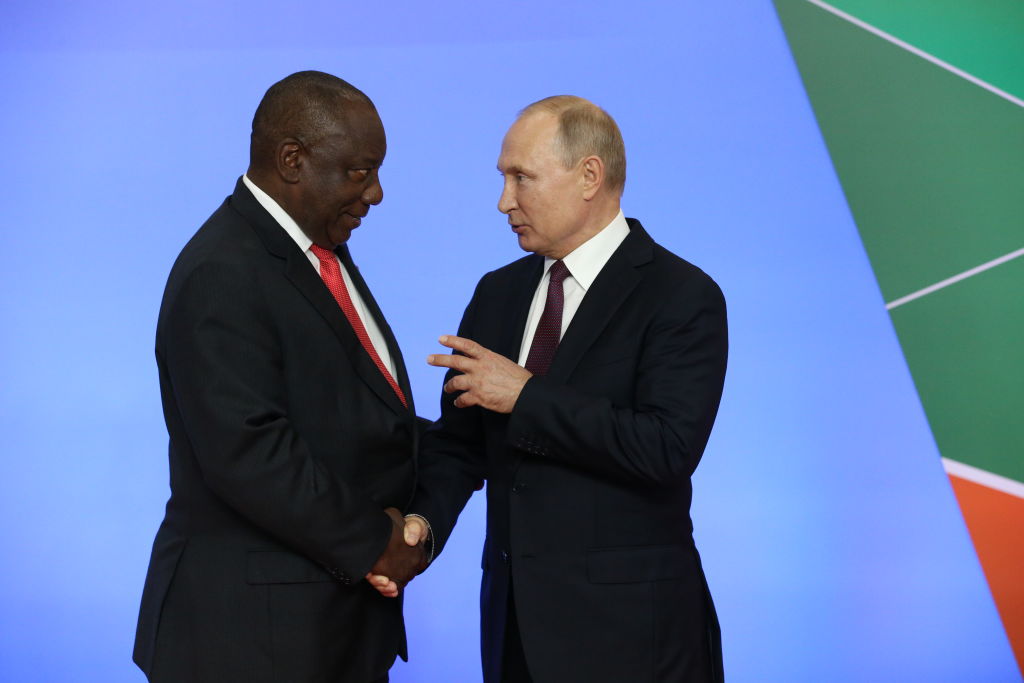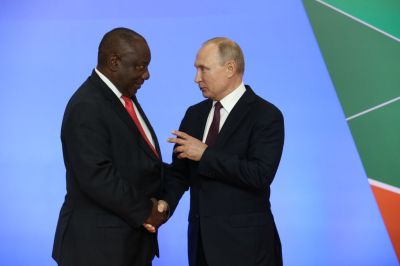U.S. efforts to rally international support for Ukraine in its defensive war against Russia for the most part have succeeded in Europe. But they’ve foundered with the United States’ largest trading partner on another continent. South Africa’s continued unwillingness to condemn Russia increasingly signals a broader shift away from the West.
In March 2022, days after the war’s start, South Africa put its stake in the ground by abstaining from a United Nations General Assembly vote calling on Russia to pull troops out of Ukraine. It later drew the West’s ire by abstaining from another resolution demanding Russia pay reparations for the destruction inflicted by the war. The African powerhouse officially claims to be neutral in the ongoing conflict, but its historic and growing cooperation with Moscow call into question its purported policy of nonalignment.
South Africa’s governing party, born out of the anti-apartheid movement of the 20th century, began fostering ties with a sympathetic Soviet Union at a time when the West was considered supportive of the white minority government. The U.S. later condemned and punished South Africa’s racial hierarchy with the 1986 Comprehensive Anti-Apartheid Act, eventually fostering ties with the democratic leadership in South Africa’s capital of Pretoria. But Moscow had already solidified its foothold as one of the dominant foreign powers in South African politics.
Russia now boasts extensive economic, political, and military ties there. In February, approaching the first anniversary of Ukraine’s invasion, the Russian, Chinese, and South African militaries held joint naval drills.
“I know that those who support Ukraine want every other country to take their side on the issue. We have chosen that we do not take sides,” South Africa’s international relations minister Naledi Pandor said in response to backlash to the drills. “We encourage settlement and negotiation. We don’t wish to become party to the conflict by choosing sides.”
Yet American officials say otherwise. U.S. Ambassador to South Africa Reuben Brigety made international headlines in May when he accused the country of shipping weapons to Russia aboard a U.S.-sanctioned cargo ship, the Lady R, in December. South African President Cyril Ramaphosa said his government would launch an investigation into the claim, but summoned Brigety for a meeting with South African officials over the remarks.
The U.S. ambassador was reportedly scolded by his superiors for saying the quiet part out loud, but he apparently wasn’t alone in his assessment. Last month a bipartisan group of lawmakers, led by Democratic Sen. Chris Coons and Sen. Jim Risch—the top Republican on the Senate Foreign Relations Committee—sent a letter to the Biden administration urging it to punish South Africa for “covertly supply[ing] Russia with arms and ammunition that could be used in its illegal war in Ukraine.” The senators cited intelligence reports indicating the African country’s military support for Moscow and called on the U.S. to rethink its membership in the African Growth and Opportunity Act, which gives 36 African countries duty-free access to U.S. markets (South Africa has benefited the most).
But some analysts think booting South Africa would be a mistake because Washington’s trade relationship with Pretoria is one of its last remaining points of leverage. “At this point, that would just drive the South Africans deeper into China’s orbit,” Frans Cronje, chairman of the Social Research Foundation, says in an interview.
China is already South Africa’s top trading partner, but camaraderie extends further. Both countries, along with Russia, have sought to look beyond a U.S.-led global order to a future of “multipolarity.” The Russian-South African relationship would help bring about a “redesigned global order,” Pandor said in December, after a meeting with Russian Foreign Minister Sergey Lavrov in Moscow.
“The Russian invasion of Ukraine has created a window of opportunity for many developing countries to reassess their global relationships, and to look afresh at what potentially could be a changing world order,” Daniel Silke, a Cape Town-based political analyst and director of the Political Futures consultancy, tells The Dispatch. “The reaction from the West in particular to the war has put South Africa in a very awkward position given her historic and current linkages to Russia.”
A dilemma over an upcoming summit of the BRICS (Brazil, Russia, India, China, and South Africa) economic bloc highlighted this tension. South Africa, which is hosting the gathering next month, would have been legally compelled as a member of the International Criminal Court (ICC) to detain Vladimir Putin upon his arrival to the country. The ICC issued an arrest warrant for the Russian president over his forces’ war crimes in Ukraine. Putin recently opted against attending, but only after Ramaphosa had requested an exemption from the ICC. “It would be inconsistent with our constitution to risk war with Russia,” the South African president said.
The brightest hope for the U.S. may be the waning popularity of South Africa’s ruling party— Nelson Madela’s African National Congress (ANC)—which is currently at its lowest point in decades. Ascendant since South Africa’s first democratic elections in 1994, the ANC has since been rocked by several corruption scandals, rampant crime, continued racial disparities, and South Africa’s sluggish economy. Just under one-third of South Africans are unemployed, and about half are living in poverty.
Governmental mismanagement exacerbates economic hardships. In the largest city of Johannesburg, homeless people direct traffic and rolling blackouts leave residents without power for hours at a time on a daily basis. In rural areas, private companies assume municipal tasks, running hospitals and schools, delivering mail, and maintaining roads. The vast majority of South Africans—across all racial groups, income levels, and political affiliations—believe that the country is moving in the wrong direction, an April Social Research Foundation report found.
These contemporary challenges pose the first real challenge to the ANC’s leadership to date, says Cronje, the foundation’s chair. “The ruling administration is weakening. It should, on the trend line, surrender control of South Africa at some point in the next decade.”
The result could include a shake-up in Pretoria’s foreign policy. The country’s largest opposition party, the Democratic Alliance (DA), has been particularly outspoken in its opposition to Russia’s invasion—frequently criticizing the current government’s ostensibly nonaligned stance.
“Morally, geopolitically, financially, it is inconceivable that South Africa would remain ‘neutral’ on the Ukraine invasion. Yet it is worse than that. Our so-called neutrality is in fact veiled support for Russia. We must ask ourselves why the ANC government would support Russia when it hurts South Africa to do so,” said DA leader John Steenhuisen at the war’s start, pointing to the threat posed to the continent by rising fuel and food prices.
As the DA and other opposition groups pick up voters, the ANC will be increasingly compelled to take its preferred geopolitical posture into account, creating an “opportunity for the Western world,” Conje says. “Played well, South Africa will a decade from now deliver what, by emerging market standards, could be a remarkably pro-Western governing administration.”






Please note that we at The Dispatch hold ourselves, our work, and our commenters to a higher standard than other places on the internet. We welcome comments that foster genuine debate or discussion—including comments critical of us or our work—but responses that include ad hominem attacks on fellow Dispatch members or are intended to stoke fear and anger may be moderated.
With your membership, you only have the ability to comment on The Morning Dispatch articles. Consider upgrading to join the conversation everywhere.